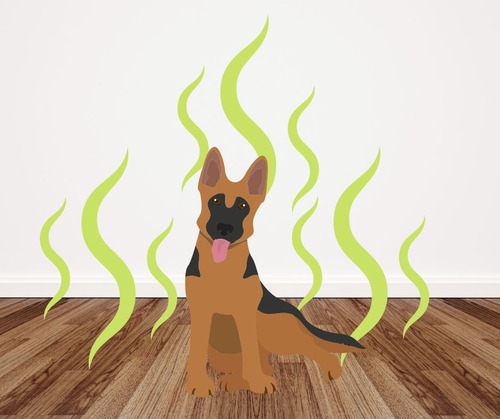Why do German Shepherds smell? This is a question I came across recently and to be honest it surprised me a little bit that so many people were actually asking it.
I have owned German Shepherd Dogs for over 20 years now and whilst they can be very inquisitive and like to investigate smelly things I have never associated them with being a smelly breed.
To anyone wondering whether to get a German Shepherd Dog and are being put off by the fact that they may smell then this article is for you.
Likewise, if you have landed on this article because you have a German Shepherd Dog who is a bit stinky then you need to read on too.
The short answer to “why do German Shepherds smell?” is actually that they don’t normally. That is they are not genetically predisposed to being smelly.
Having said that there are some occasions that they may smell which I have listed below but smelling bad is not something that is normal to the breed at all.
If they are smelling then you need to find the cause and then in most cases, you can put a stop to it.
The first step is to identify what type of smell you are experiencing. Is it a damp smell, sweaty smell, sour smell etc. Some will be obvious what it is others not so much.
Possible Causes Of German Shepherd Odour
Damp
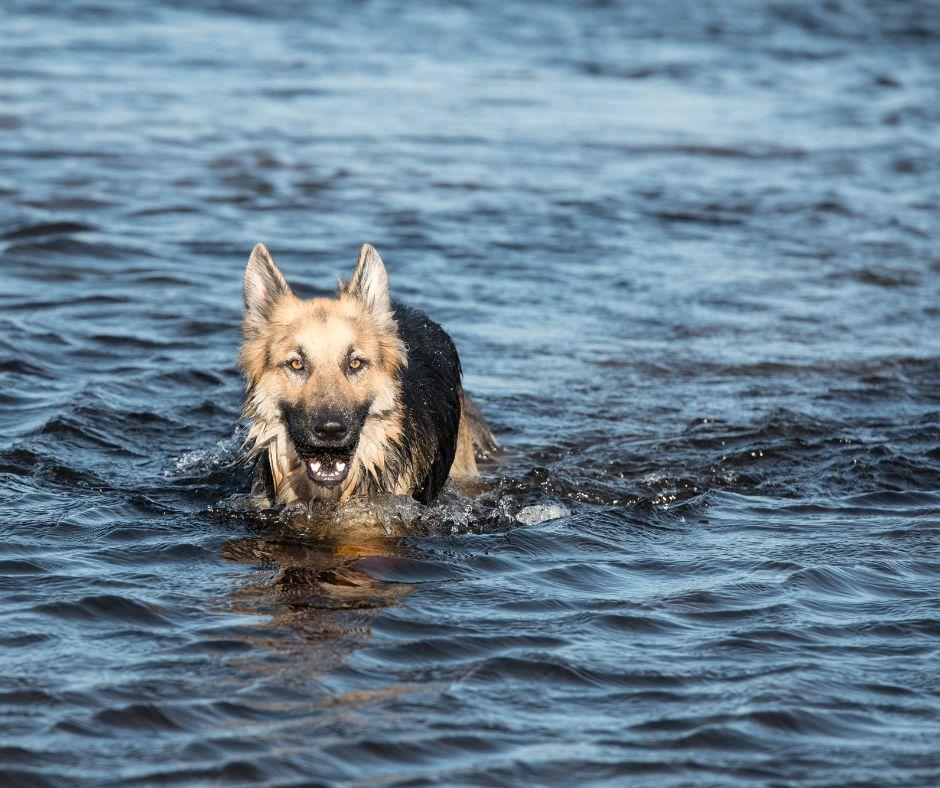
Most people know what damp dog fur smells like. German Shepherd Dogs have very thick coats that can take a long time to dry if they have gotten wet. Whilst rainwater is not too bad if they have been swimming in lakes and rivers etc this will also have an odour of its own which may stay with your dog even when has dried out thoroughly.
The damp smell just from getting wet from a bit of rainwater usually disappears when your dog has thoroughly dried out but if you are left with a lingering river or dyke smell you may want to consider bathing your dog.
It is not advisable to bathe German Shepherd Dogs often so if your dog is a regular swimmer then you may prefer to use an odour neutralising deodorant instead. Just make sure it’s one that is specially formulated for dogs.
Soiled Paws Or Fur
This will be an obvious dog poo smell. You will need to find where the soiling is and thoroughly clean the area to get rid of it.
Wind or Gas
Flatulence is something that can affect German Shepherd Dogs quite a bit and is usually related to your dog’s diet. They have normally either eaten something they should not have eaten or they have experienced a change in food.
It usually clears up once the digestion process has returned to normal. If your dog is constantly experiencing this then I would recommend you take a look at their diet as it may be a sign of intolerance or other medical issues that will need some veterinary advice. See SIBO below.
Bad teeth
Dental decay and gum disease can not only be painful for your dog it can also cause bad breath. It is important that you take good care of your dog’s teeth and check them regularly for any issues that may cause problems. Regularly brushing their teeth with a toothpaste formulated specially for dogs is recommended to prevent this type of problem from occurring in the first place. Any odour that is being caused by dental issues will go once the dental problem has been treated.
In Season or Heat
When bitches come into season or heat as it is sometimes called they release blood from their uterus and this can give off quite a potent smell. It can be eliminated completely by having your dog spayed but if this is not an option for you then the use of dog diapers that are changed regularly can help keep it to a minimum. This type of odour will go away once your dog’s heat period finishes.
Skunk
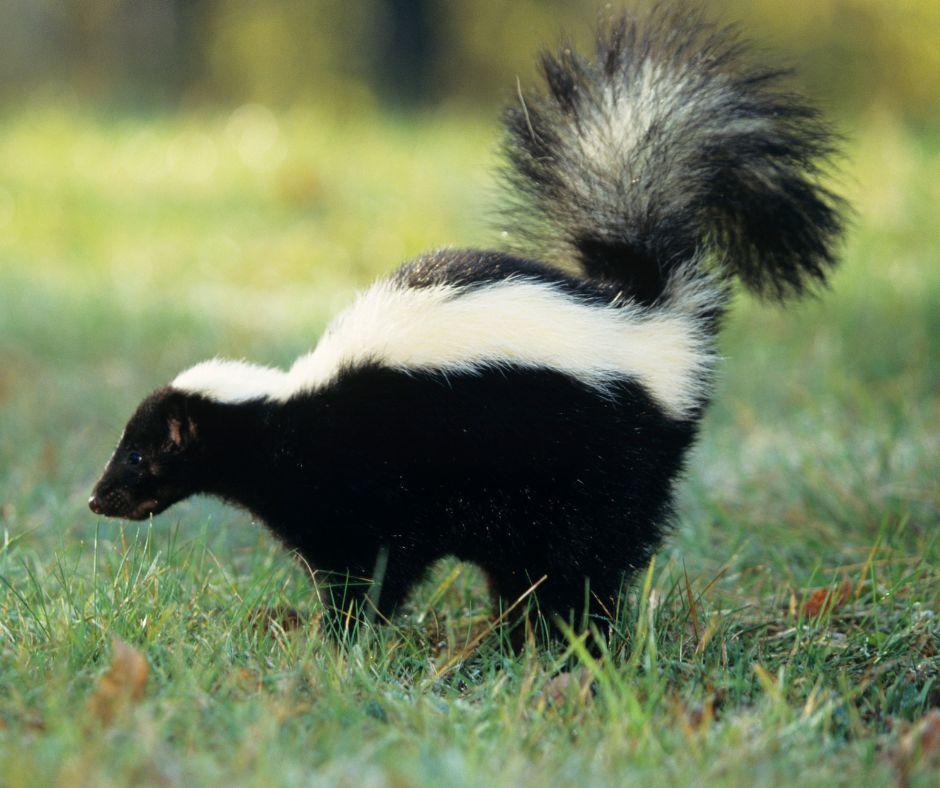
Oh, that dreaded skunk stink. Not a common problem in the UK as I don’t believe we have any skunks living in the wild but I know it is quite common in the US and some other countries. Unfortunately, German Shepherd Dogs are very inquisitive and if they see a small animal such as a skunk they may very well want to go and investigate it.
The skunk however is unlikely to see the encounter in the same light and will most likely give your dog a squirt from their distinctive scent glands. Unfortunately, this is a terrible smell that is very difficult to get rid of. Regular bathing won’t get rid of the odour that clings to your dogs fur and skin.
The most popular method for getting rid of that skunk smell is to use a home made recipe using just 3 household ingredients.
- Baking Soda
- Dishwash Soap
- Hydrogen Peroxide
For best results, it is better to apply this as soon as possible after the encounter before the skunk spray has the chance to settle into your dog’s coat and skin.
First of all mix together 1/4 cup of baking soda, 1-2 teaspoons of mild dishwashing detergent and 1 quart 3% hydrogen peroxide solution. Gently rub this into your dog’s fur in the affected area, and leave to dry for 5 minutes before rinsing off with warm water. The solution should neutralise the bad odour and leave your dog smelling sweet again.
Rolled In Something Smelly
This is more of a dog trait in general rather than one specific to a German Shepherd but some dogs really do like to roll in the smelly things. This can be anything from animal droppings to garbage. Not all dogs do it and I honestly don’t know the reason behind it. One theory is that it is an ancestral instinct to hide their own scent from that of their prey. Another is that they are showing off to other canines by wearing the scent of their prey.
Whatever the reason is it is not something we humans want them to do as these smells can be pretty nasty and take some getting rid of especially fox poo. As with skunk sprays, you will need to wash the affected to get rid of the smell completely.
Bathing German Shepherd Dogs regularly is not recommended so if this is something your dog is doing a lot then it’s time to get to work training them to leave it.
Anal Sac Disease
Many dogs can suffer from anal sac disease, not just German Shepherds and it can be a problem with both male and female dogs. Dog’s anal sacs are situated at either side of the anus in the 4 and 8 o’clock positions. They are lined with sweat glands which excrete a fluid that drains into the anus which is then usually passed out of the body during bowel movements.
If you have ever wondered why dogs sniff other dogs’ poo it’s because the fluid excreted from the anal sac with the faeces has a unique scent which is individual to the dog. This unique scent leaves behind their mark alerting other animals to their presence.
Unfortunately, these sacs which are also referred to as anal glands may sometimes become blocked or impacted and impacted anal sacs can be extremely painful for your dog. If left untreated they can also become infected causing damage to other areas in the body so impacted sacs will need to be regularly drained to keep this condition under control.
Although anal sacs normally drain during a bowel movement a dog does not have control over them so fluid may leak out on occasions when a dog is resting. Whilst this issue is not as serious for your dog as a blocked sac is you are likely to experience a bad fishy type odour from this problem.
If you suspect your dog may have problems with its anal sacs then you should get your vet to check it out.
Skin Infection
You should regularly check your dog to ensure there are no wounds or other skin issues. Any open wounds can become infected very quickly and this type of infection can give off an odour. Infected hair follicles are another skin problem that can result in large boils forming which will not only be extremely painful for your dog they also smell very bad when they burst.
Dogs can sometimes also get yeast-type infections which give off an unpleasant odour too. Regular grooming of your dog and treating any wounds promptly will help to reduce any skin related issues but you should always seek veterinary assistance for any infections that are likely to need a course of antibiotics to help clear them up.
Ear Infection
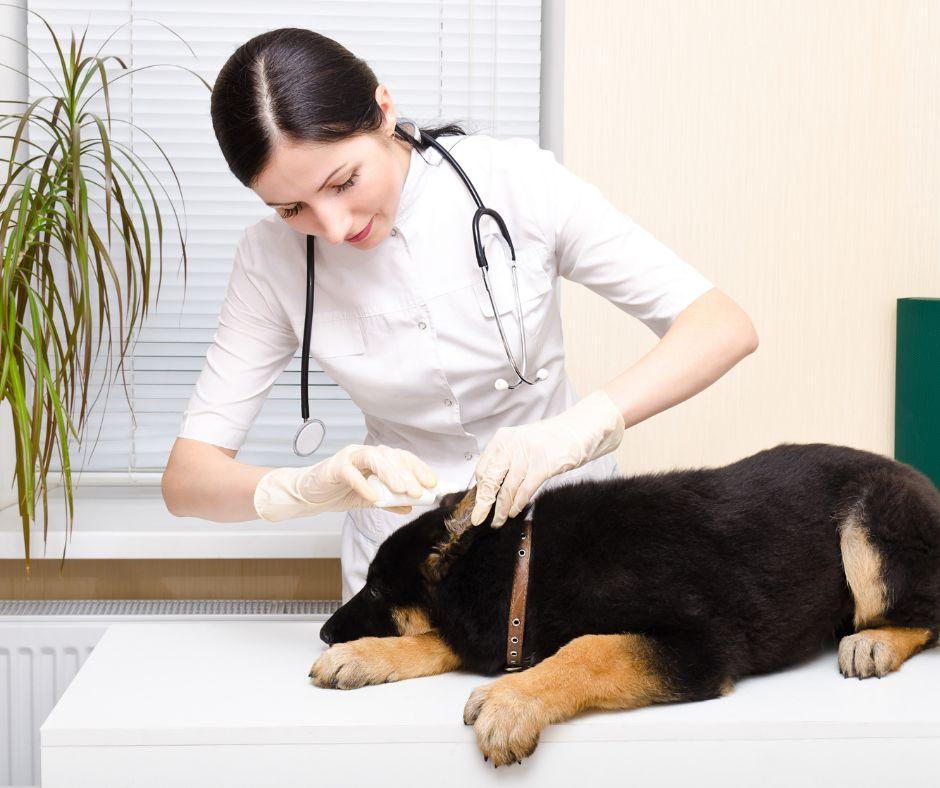
As with skin infections ear infections can also give off a nasty smell. Dogs with ear infections will usually paw at their head and you can sometimes see some fluid coming out of the ear canal. Dogs’ ears are not supposed to smell so if it is the smell that has alerted you to there being a potential problem then you need to get it sorted as soon as possible.
Ear infections are painful and as is the case with any infection it needs to be treated by a professional so take your dog to the vet to get it checked out.
Fear
German Shepherd dogs are known for their bravery but they are not immune from feeling fear and stress. Fear can be something a dog experiences when encountering something they are not sure about. It can also be due to poor socialisation or a bad life experience.
Although not unique to German Shepherds when faced with a fearful or stressful situation it can sometimes stimulate the anal sacs to eliminate which will, unfortunately, give off a very unpleasant odour. It will usually dissipate quite quickly once your dog settles down but ensuring your dog is well socialised is a good way to reduce the occurrence of this type of situation occurring.
Exocrine Pancreatic Insufficiency (EPI)
Exocrine Pancreatic Insufficiency (EPI). This is a life threatening medical condition that is a common health problem affecting many German Shepherd Dogs. My male dog Cody has it so I am all too familiar with the condition.
When a dog has this condition they lack the necessary enzymes to digest their food. This results in copious amounts of undigested food being passed straight through the gut. Undigested food is then eliminated as pale coloured diarrhoea which has a very nauseating distinctive odour to it.
If you notice your dog is producing this type of faeces, and they are eating loads but losing weight then it’s time to seek veterinary help. This condition is unfortunately very common in German Shepherd Dogs and a simple blood test will confirm whether your dog has it or not.
Dogs with EPI need to be treated with lifelong pancreatic enzyme supplements. It is therefore important to get it diagnosed as soon as possible because if left untreated they will starve to death no matter how much food they eat.
Small Intestine Bacterial Overgrowth (SIBO)
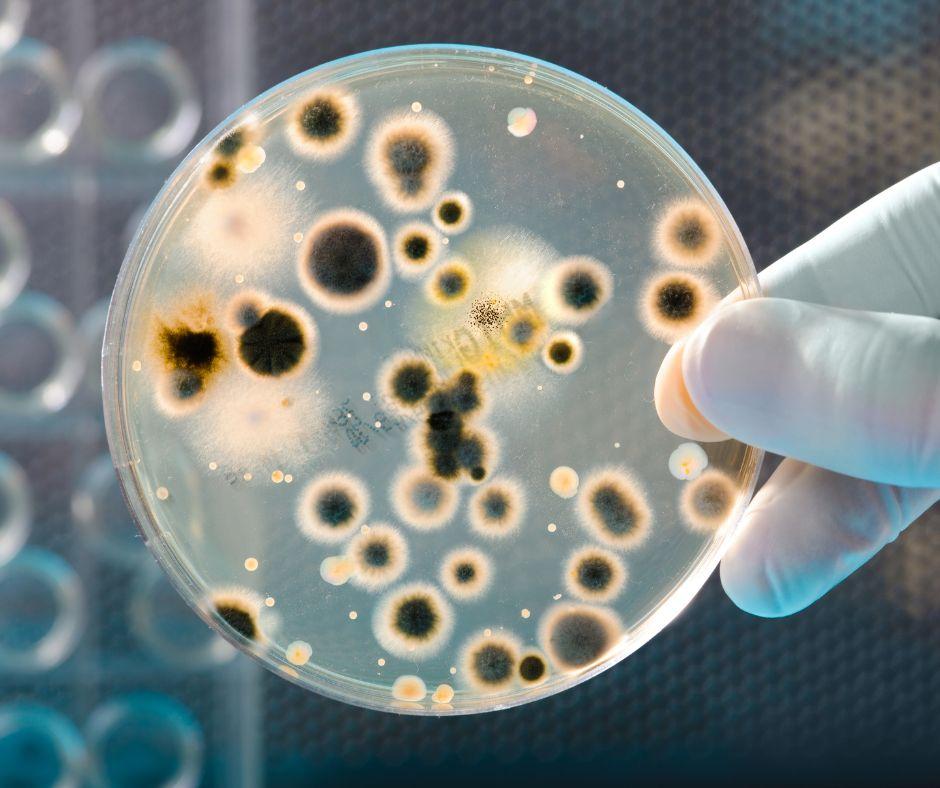
Small Intestine Bacterial Overgrowth is another reason your dog may be smelly. This is a condition that I have experienced with my Dog Cody as it is quite common in dogs with EPI.
It can, however, be secondary to other conditions too and even occur on its own so just because a dog has SIBO does not necessarily mean it has EPI although I would recommend you get your dog tested as part of your vets investigations.
The overgrowth of bacteria causes excessive gas in the gut which can be heard as stomach rumbles that are very loud and frequent. Your dog will also be extremely windy from their rear end which won’t go unnoticed. They will also have chronic diarrhoea lasting for a long time causing weight loss despite having a big appetite.
SIBO is a serious condition that needs urgent investigation and treatment from your vet. When a dog has SIBO they are not absorbing the important nutrients from the food they eat. Unfortunately like EPI if this condition is left untreated your dog could starve to death.
Chronic gas and diarrhoea lasting longer than a week should always be investigated to rule out any serious conditions.
Frequently Asked Questions
Here are a few of the questions that are commonly asked on the subject and I thought I would take the opportunity to answer them here.
Q: How do I make my German Shepherd not stink?
A: Regular grooming and checking for anything obvious that is causing your dog to smell will help. After eliminating any medical issues you could try using a deodorising pet spray.
Q: Do German Shepherds make your house smell?
A: No more than any other dog. If I have ever experienced my house smelling of dogs it’s usually if the dogs have got wet from the rain and are drying off. Also if it’s noticeable when I come home this is usually an indicator to me that their bedding is due for a wash rather than any smell coming directly from the dogs themselves. It could also be coming from some of their toys as they can become very stinky over time.
As long as you rule out any health issues, carry out a regular grooming routine and make sure their bedding and toys are washed regularly then having a German Shepherd should not make your house smell.
Q: How often should you shower a German Shepherd?
A: You should not shower a German Shepherd too often as regular washing will remove essential oils from their skin causing it to become dry. This can cause itchiness which can also result in skin infections. I would try to limit bathing your German Shepherd Dog to no more than 4 times a year as this will give the skin time between bathings to replenish any lost oils.
Q: How do I keep my German Shepherd clean?
A: Whilst bathing and showering too often is not recommended if your dog is soiled then sponging down that particular area will be much better than a full body bath. This coupled with a regular grooming routine to remove dead hair and skin should be sufficient to keep your dog clean and healthy.
Q: How can I keep my dog smelling good between baths?
A: You could try using a deodorising pet spray which are available to buy from good pet stores and Amazon.
Q: Why does my German Shepherd smell like fish?
A: It is likely that your dog has an issue with it’s anal sac as described above. The fluid which is extracted from these sacs does tend to smell like fish. If some has leaked out onto your dog’s fur then this could linger for a while. If you are regularly experiencing this then I would recommend you take your dog to the vet to investigate whether they have a problem with their anal sac.
Final thoughts
German Shepherd Dogs don’t generally smell and if they do then there is a reason for it that you will need to investigate. If it’s nothing obvious then there could be a medical explanation for it so I would highly recommend that you take your dog to the vet to be checked over.
I hope this has answered your questions regarding the subject of why do German Shepherds smell. Thanks for reading and if you have any experiences with a smelly German Shepherd that you would like to share please feel free to do so in the comments below.
